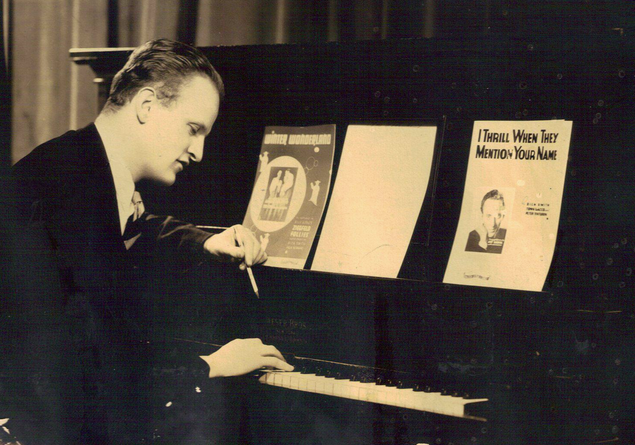Here's how the lyrics to some of your holiday favorites came to be | Ervolino
Do you hear what I hear?
The music, I mean.
To me, it’s not December until I hear Andy Williams singing “The Holiday Season” and Adam Sandler crooning “The Chanukah Song.”
The former reminds me of my childhood. My parents played that Andy Williams album to death. (I have my own copy now on CD.) The latter just makes me laugh, as I listen to Sandler talk about yarmulkes and dreidels and list who is and isn’t Jewish.
“Some people think that Ebenezer Scrooge is/Well, he’s not, but guess who is?/All three Stooges.”
(Ha! You think it’s easy rhyming anything with “Ebenezer Scrooge?”)
Sandler introduced the song on “Saturday Night Live” in 1994, so it’s relatively new. Some holiday songs go back to the Civil War. Some are even older than that — and, sound like it.
Take “Deck the Halls.” Do you really know what “Troll the ancient Yuletide carol” means?
(If not, you can troll the internet and find out.)
Another standard, “Jingle Bells,” dates back to 1857. And there are stanzas that few contemporary singers include in their renditions, including the one in which the narrator recalls his sleigh overturning: “We got into a drifted bank and then we got upsot.”
Upsot?
A past participle of “upset,” it was used (sparingly) in the 19th century, which may be why so many contemporary singers leave it out altogether.

One of my holiday favorites, “Winter Wonderland,” isn’t a holiday song at all. It’s actually a romantic tune set during wintertime that never mentions Christmas or Chanukah.
Its most misunderstood lyric, about a couple building a snowman and pretending he is “Parson Brown,” imagines a parson — a now little-used term for minister — who would marry them.
Some contemporary singers have changed “Parson Brown” to “circus clown” — which makes no sense: “We’ll pretend that he’s a circus clown. He’ll say ‘Are you married?’ We’ll say, ‘No man! But you can do the job when you’re in town.”
Huh?
“Winter Wonderland” was published in 1934 and both of its songwriters were deceased by the mid-1940s. There’s no way of knowing what they would have thought of their parson becoming a clown — just as there is no way of knowing what the late Stephen Sondheim would think if someone rechristened one of his best-known tunes as “Send in the Parsons.”
Occasionally, changing holiday song lyrics can land you on the evening news. In 2011, a Michigan school teacher tinkered with “Deck the Halls,” telling students that the apparel being donned in the tune was “bright” rather than “gay.”
The teacher said the kids tittered at “gay apparel,” so she made the substitution.
(Was she a substitute teacher?)
School officials and most parents considered the alteration unnecessary.
(Amusingly, the earliest version of the song didn’t say “Don we now our gay apparel.” It said, “Fill the meadcup, drain the barrel…” but was changed because “meadcup” had become too obscure.)
More Ervolino: How long is too long to leave up your Christmas tree?
Getting healthier is a state of mind: How to exercise more to feel better | Ervolino
A few years ago, there was an uproar over “Baby, It’s Cold Outside,” another non-holiday song that gets plenty of December airplay.
Detractors said the song suggested date rape, even though the tune, sung in the 1949 film “Neptune’s Daughter,” is clearly fun and flirty onscreen. (The “victim” in question has plenty of opportunities to leave, but doesn’t.)
Will “Baby…” corrupt today’s children? I doubt it. These kids consider Mariah Carey an old lady. I doubt they’re paying much attention to Ricardo Montalban records.
If you’re old enough, you probably know that “Here We Come A-Caroling” was originally “Here We Come A-Wassailing,” which referred to a warm cider drink that dates back to the Middle Ages.
The drink recently made a comeback and, today, there are plenty of newfangled wassail recipes online.
Perhaps the most frequently-altered popular holiday song of all is “O Christmas Tree,” which started life as “O Tannenbaum.”
Because the song was written in German, it has been adapted many times, with umpteen variations.
I grew up singing, “O Christmas Tree! O Christmas Tree! Your color is unchanging!”
The actual translation of “Wie treu sind deine Bl?tter!” is “How loyal are your leaves!”
Other variations include “how lovely are your branches,” “of all the trees most lovely,” and so on, into infinity. I think everyone who sings the song rewrites it.
On my next Christmas album, I’m singing. “O Tannenbaum! O Tannebaum! Get in here, you got a phone call!”
Have any other lyrics caused problems? Well, getting back to that darned “Winter Wonderland,” another line has elicited some controversy: “We’ll frolic and play the Eskimo way” — a reference to Eskimo couples rubbing noses.
I’ve always like the line, since so few songs mention Eskimos. But, apparently, the notion that Eskimos rub noses, popularized by the 1922 film “Nanook of the North,” is a myth.
Substitutions have included, “the old-fashioned way,” and “the reindeer way” — although, as several incensed reindeer have asserted, they don’t rub noses, either.
It makes them upsot.
This article originally appeared on NorthJersey.com: Christmas songs' weird history to lyrics of holiday classics